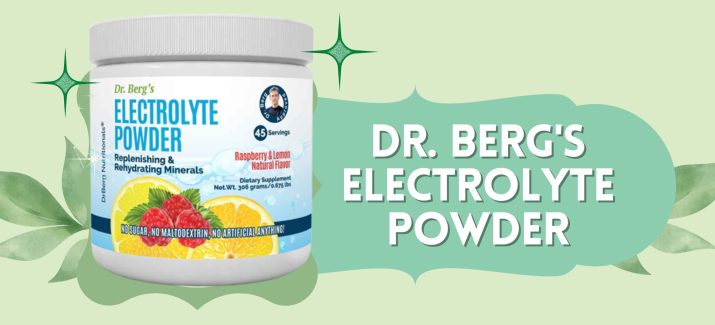7 Low Potassium Symptoms to Look Out For: Complete Guide 2024
By Vanessa Richards
January 10, 2024 • Fact checked by Dumb Little Man

We hate it when someone replies “K” to our text. It seems to sound rude, and we will probably just ignore it.
Now is not the time to ignore this “K,” especially if this “K” concerns your potassium.
Ever wonder why your heart beats in rhythm? Surely it's not about the butterflies in your stomach but the potassium responsible for your muscle contractions.
The mineral “K” is an essential electrolyte that activates cell and nerve functions by stimulating electrical impulses throughout the body. Moreover, it regulates fluid balance.
The kidney helps with the normal potassium concentration and keeps the proper balance of enzymes inside the body. It removes excess amounts through urine excretion.
Read more about potassium disorders in this detailed guide.
Low Potassium Symptoms: What is the normal Potassium level?
There are scenarios where a person only consumes too little potassium leading to a condition medically known as hypokalemia. It may result from poor diet or digestive tract problems such as vomiting and diarrhea.
| Potassium Level | Value (mmol/L) | Symptoms |
|---|---|---|
| Normal | 3.5 mmol/L and above | Asymptomatic |
| Mild Hypokalemia | 3-3.5mmol/L | Asymptomatic |
| Severe hypokalemia | 2.5 mmol/L & below | Muscle cramps & weakness, palpitations, and etc. |
The normal level of K for an adult is 3.5 mmol/L. Anything lower could cause symptoms of hypokalemia.
Neglecting this can cause severe hypokalemia, a life-threatening potassium deficiency, in which levels are less than 2.5 mmol/L.
Symptoms may not usually appear with a slight reduction of the blood's potassium level. Therefore, it is imperative to have regular tests and checkups to measure your potassium level before it's too late.
Diagnosing Low Potassium Problems
To accurately measure your body's K, a doctor will do various tests. This test may be one of the following:
Blood tests
A tiny needle will be used by a medical practitioner to draw blood from a vein in your arm. The small amount of sample will be placed into a vial or test tube for analysis to determine if you have low blood potassium levels.
Urine tests
The potassium urine test evaluates the K content of a specific volume of urine. Your urine sample is examined at a lab after you provide it.
If necessary, the medical professional might ask you to do a 24-hour urine collection at home.
ECG or EKG
Your doctor might also advise an electrocardiogram and a thorough metabolic panel.
How to Check Your Body's Potassium Levels: 7 Low Potassium Symptoms

Here are some signs and symptoms of potassium deficiency that you should watch out for:
1. Check your heartbeat
Heart palpitations are signs of mild hypokalemia. If you are experiencing this often, try to relax and check with a doctor.
Never disregard these signs, as they may result in arrhythmia or abnormal heart rhythms if not properly addressed.
2. Too much is dangerous
Excessive urination (polyuria) and excessive thirst (polydipsia) are signs of severe potassium deficiency. Once hypokalemia lasts for an extended time, it impairs our kidneys and can cause kidney disorders.
3. Can you feel it?
Experiencing paresthesia or persistent tingling and numbness is a sign of damaged nerve function due to hypokalemia. Although harmless, it's best to have it checked by doctors.
Muscle weakness and paralysis can also occur due to low blood potassium.
4. Inhale, exhale
Lungs expand and contract with the help of potassium. When there is a low amount of potassium in the body, shortness of breath may be experienced.
Worst is the lungs can stop working due to severe hypokalemia.
On the other hand, hyperkalemia or having excessive potassium can also cause serious lung problems.
5. Muscle cramps and breakdowns
Potassium sends and relays signals that trigger skeletal muscle contractions. Severe hypokalemia can cause painful cramps or uncontrolled contraction of muscles and may lead to paralysis.
Moreover, muscle tissues can be affected, too, causing rhabdomyolysis. It is a fatal condition wherein damaging proteins are released into the blood leading to organ damage.
6. Track your digestives
Potassium sends signals to the smooth muscles on our stomach. These contractions are vital in digesting foods.
The digestive process can slow down with severely low levels of K, causing bloating and constipation.
7. The pressure is on
Too much sodium increases blood pressure. To make it balanced, potassium, as an electrolyte, regulates sodium levels through urine excretion.
The kidneys remove excess potassium and excess sodium as necessary when the blood is filtered.
If there is a low potassium level, a high sodium presence increases blood pressure.
Vomiting, nausea, and appetite loss are possible additional symptoms. A decrease in mental activity, disorientation, abdominal distention, and cardiac abnormalities may also be present.
Electrocardiograph alterations may also show these conditions.
Causes of Low Potassium
The following are some causes of potassium deficiency:
- Chronic diarrhea: resulting in too much loss from the digestive tract. This may be brought on by infections, irritable bowel syndrome, excessive laxative use, or diuretics.
- Prescription drugs: include Beta 2-agonists, theophylline, insulin, diuretics, corticosteroids, and antibiotics.
- Diuretics cause the kidneys to expel too much salt, water, and potassium. It can occasionally induce the release of too much potassium in the urine.
- Hypokalemia can happen due to the hormones insulin, albuterol, and terbutaline. The movement of potassium from the blood into cells is increased.
- Eating disorders: These include laxative misuse, purging, and anorexia nervosa.
- Malnutrition and Poor Diet: Low consumption of potassium, which is present in various foods, seldom results in hypokalemia.
- Cushing syndrome and Hyperaldosteronism: A hormone called aldosterone, which the adrenal glands overproduce, causes the kidneys to excrete a lot of potassium.
- Kidney disease or failure and other diseases such as Bartter syndrome, Gitelman syndrome, and Fanconi syndrome.
- Hypomagnesemia or low levels of magnesium: Magnesium aids in the transport and absorption of K ions from cells. For this reason, magnesium deficiency can lead to low potassium levels.
- Refeeding Syndrome: Insufficient dietary intake of potassium occurs as a result of refeeding.
- Excessive licorice consumption: A substance found in black licorice root can reduce your K content.
- Excessive perspiration: Potassium can also be lost through sweating, especially when an individual is under heat stress. When doing strenuous exercise, it's a good measure to manage electrolyte levels by taking sports drinks.
>>Related Article: Daily Greens Superfood Powder Reviews 2024: Does it Really Work?
How to Correct Low Potassium Levels
A person's potassium level will determine the type of treatment for hypokalemia. Varied interventions such as potassium supplements and medications are needed depending on the mildness and severity of potassium deficiency.
Regular potassium intake should counter low blood potassium, but you should still do routine blood work just to be sure.
It is important to consult your doctor to further test the underlying cause and current medical conditions. Hypokalemia can be fatal and needs immediate medical attention.
Here are some ways that can help you increase your potassium in the blood.
Natural Remedies
A nutritious diet is one of the healthiest ways to treat potassium deficiency.
Eating foods rich in K can naturally restore your potassium balance so consider adding these to your grocery list:

| Potassium-Rich Foods |
|---|
| Avocados |
| Dried Apricots and Dried Prunes |
| White Beans and Lentils |
| Coconut Water |
| Orange and Orange Juice |
| Bananas |
| 1 % fat milk |
| Spinach and Swiss Chards |
| Nonfat Fruit Yogurt |
| Broccoli |
| Brown rice |
| Potatoes and Sweet Potatoes |
| Parsnips |
| Tomato Sauce |
| Clams |
| Salmon |
Exercises

Muscular strength and contraction require potassium. A person with good health should be able to regulate a fluid balance and enough potassium after a workout.
On the other hand, if you don't have enough potassium, there is a possibility of losing your electrolyte balance. It can lead to cramping and fatigue.
The worst is it can lead to arrhythmia.
Medications
Immediate medical interventions are needed to treat hypokalemia:
- Oral potassium chloride is given to patients with chronic potassium loss. It is also given when K levels need to be maintained or replaced. Potassium chloride may have side effects, so it's better to request a prescription.
- Ibuprofen, naproxen, and other medications with nonsteroidal anti-inflammatory properties (NSAIDs) are frequently used to reduce aldosterone levels & increasing potassium levels.
- Medication such as angiotensin-converting enzyme inhibitors or angiotensin receptor blockers can raise the body's potassium levels.
- A doctor might advise intravenous K for patients with severe hypokalemia who need immediate medical attention.
Supplements
Potassium supplements together with a balanced diet can treat mild hypokalemia.
When potassium levels fall abruptly, especially after vomiting or diarrhea, a potassium supplement can rescue the day.
All Natural Supplement For Proper Hydration and Improved Brain Function: Dr. Berg's Electrolyte Powder
Incorporating potassium in your diet is made easy and possible now with Dr. Berg's Electrolyte Powder. The first complete Electrolyte formula, All-IN-ONE, is made especially to recharge and energize your cells!
This electrolyte powder drink is clinically proven as a natural dietary supplement. It helps you acquire the needed nutrients and minerals. Power packed with 1000 mg of potassium, calcium, magnesium, sodium, trace minerals, stevia, and lemon raspberry.
The supplement's electrolyte blend promotes muscular health, hydration, high energy, athletic performance, and fitness recovery without additional sugar. It's definitely Keto friendly and one of the best potassium supplements out there!
Shop Dr. Berg's Electrolyte Powder at Official Website.
Full Article: Dr. Berg’s Electrolyte Powder Reviews 2024: Does it Really Work?
Conclusion
“K” is an essential electrolyte that keeps humans alive. Maintaining potassium stability will enable us to live life to the fullest.
Often, signs and symptoms of potassium deficiency or hypokalemia are disregarded. An immediate examination is a must since it may be fatal.
Increased potassium in the blood can be achieved in a variety of ways. We can manage it by maintaining a healthy diet, taking medication, and taking supplements.
There should be no excuse: a cup of Dr. Ber's Electrolyte Powder contains an all-in-one powder supplement to boost potassium. It's time for you to recharge!
Click here to Get Dr. Berg's Electrolyte Powder at a Discounted Price.
>>Related Article: 9 Signs You Have An Electrolyte Imbalance: Complete Guide 2024
Low Potassium Symptoms FAQs
How much is too much potassium?
An adult's typical potassium level is between 3.5 and 5.2 mmol/L, anything greater is regarded as having excessive potassium.
Hyperkalemia, often known as high potassium, is a medical condition when there is greater than normal potassium in the blood. A blood potassium level of more than 6.0 mmol/L can be harmful and usually necessitates rapid treatment.
What happens when you take potassium supplements?
Supplements can aid in lowering high blood pressure, stroke and kidney stone prevention, bone health, and managing blood sugar levels. It plays a major role in increasing potassium levels and production.
Make sure to ingest the right amount of potassium, to prevent hyperkalemia that can also cause muscle weakness. This can bring on irregular heart rhythms or other severe heart problems that might be fatal.
Are blood tests for potassium levels accurate?
According to studies, the accuracy of a blood test in determining potassium levels ranges from 60 to 70 percent.
A urinalysis may be requested to check the level of potassium in your urine if the cause is unclear. A basic or comprehensive metabolic panel and an electrocardiogram may also be prescribed by your medical professional (ECG or EKG).
Vanessa Richards
Vanessa is a mom of 3 lovely children and a software geek. Outside of her career as a health and wellness instructor. She enjoys writing and researching on topics such as finance, software, health and culinary.



